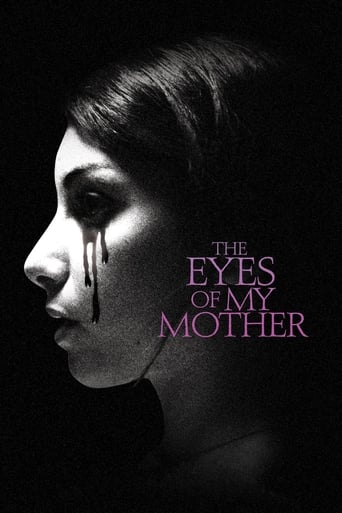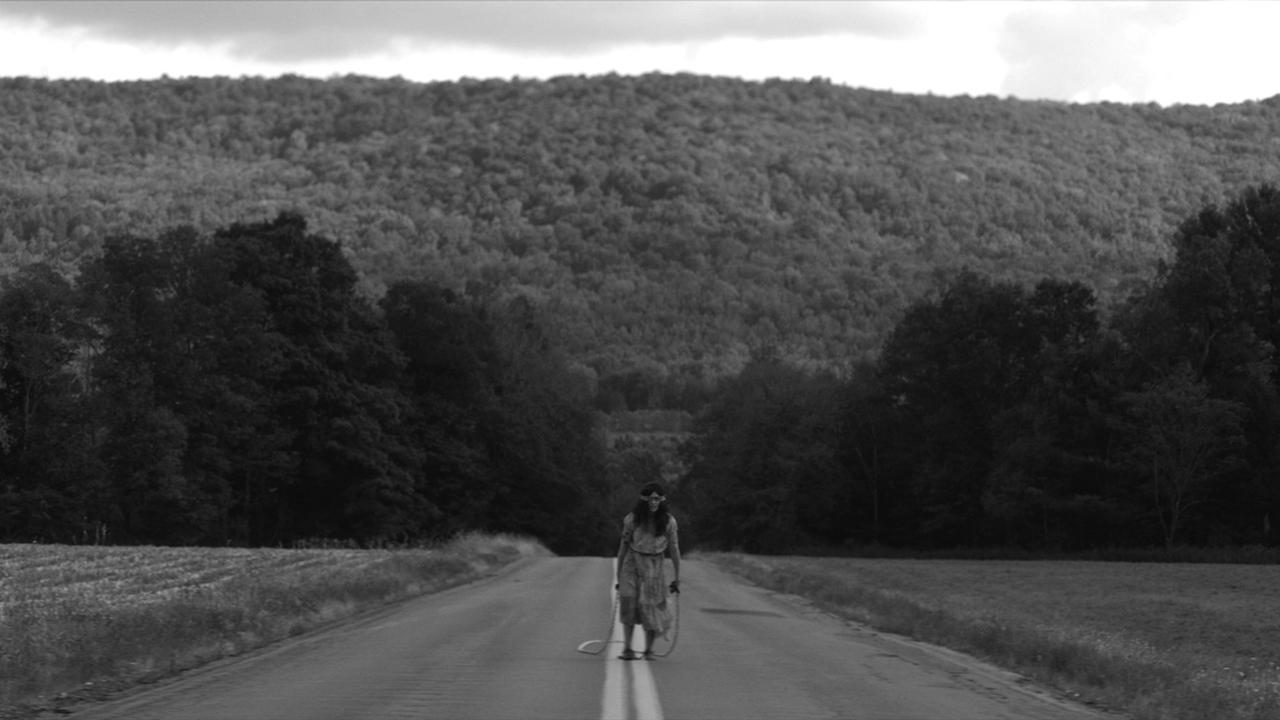kissgergelylaszlo
Movies like this is the reason why some people despise art in general.
saxyandiknowit
The Eyes of My Mother is a chilling psychological horror film. I found this film scrolling through Netflix and knew nothing about it, other than the brief and vague summary. After viewing all 76 minutes of it, I can honestly say I was fairly floored.
The film begins with the young main character, Francisca, tending to the cows on her rural and isolated farm home with her mother, am older portuguese woman who used to work as an eye surgeon. She explains the legend of Saint Francis of Assisi to Francisca and they go inside to clean the head of one of the cows. Later on, a strange door to door salesman comes to their home and asks to come in and use their bathroom. You know where this is going. The aging father returns home to find Francisca unharmed and the man mutilating the body of the mother in the bathroom. Chillingly undisturbed, the father knocks the man unconscious and chains him up in the barn, before making Francisca clean the bathroom and help him bury the mother's body, which she does quietly and compliantly. The next day Francisca goes to the barn to tend to the man's wounds, and inquiries about his desire for killing. When he asks if she plans to kill him, she sincerely responds, "why would I kill you? You're my only friend. I'm going to take care of you." Where the film goes from here, I will leave unexplained. It's worth experiencing for yourself with no knowledge.
There are influences apparent here: I see similarities to both Lars Von Trier's 2009 film Antichrist, as well as Cormac McCarthy's 1973 novel Child of God. I don't know if I would call it better than either of these works, but it is fascinating in it's own right. With subject matter like this, it would be far too easy for this film to devolve into a simple fucked-up torture porn gore fest, but to the contrary, the violence, while there and disturbing, is handled surprisingly elegantly and with restraint. Many of the most gruesome moments are not shown onscreen, and when violence is shown, it is brief and not very bloody. This isn't to say the film is watering down anything, quite the contrary: the film is very deeply disturbing and many of these images will sear into your subconscious and refuse to go away. This is because the director understands what makes effective horror- it is what you don't see, it is the subtle creeping things, it is the things that you notice in the frame that aren't forced into your face. Presentation is everything, and this film's presentation makes it chillingly effective. The use of long takes, wide angles, slow creeping movement in the frame, and especially how the subjects are left small in their environments in many shots, makes these images of depravity all the more disturbing.
Despite this, the film is thankfully more than simply an exercise in how uneasy the audience can feel- there is a good bit to chew on thematically as well. This is ultimately a story about isolation and the damage it can have on a person in the long term. The mother's retelling of the story of Francis of Assisi at the beginning sets up much of the symbolism for the film- Francis spent much time in his life in isolation, and ended up being fatally afflicted with Trachoma (and infectious disease of the eye). Eyes are an important motif in the film that are returned to frequently, as well as what they represent- bearing witness, "seeing" into another person and the inner workings of their thoughts. It is the depravity Francisca witnesses as a child that scars her, and there are more instances of these things throughout the film that hopefully one will notice while viewing. This, paired with her lifelong isolation and loneliness, are the determining factors for her descent into depravity. Her being named for Saint Francis of Assisi is apparent and it creates a very interesting juxtaposition. Ultimately, despite the fact the she becomes a terrifying presence, we still fell deep sympathy for her, and to an extent, we understand her eventual fall, with no small thanks to the hauntingly real performance of the main actress.
There are points in the film where you feel the story could be going into ridiculous territory, but it does not move in a predictable fashion. As I was watching this, I was dreading the point where a part of the film dragged, or there was some misstep in the story, but every shot in this film, every line, feels like the director and writer was completely confident in it succeeding, and it does.
The directing and camerawork are also very pleasing for anyone that analyzes these things in a film. Right from the beginning, this cinematography is fascinating- the warm black and white gives the film an almost otherworldly feel, and the shots, whether it be two characters on a couch inside or a shot of the bucolic countryside, are all framed and composed like each one is a beautiful photograph and it is very visually pleasing. The film seems to be set during the 1950s or 60s, but it is very timeless and almost feels like it is set in a different world entirely. The fact that this is a director debut makes it all the more impressive.
This isn't to say the film is entirely flawless- there is a piece of ADR near the beginning that I can only describe as awfully synced, and there are some scenes around the second act (the three acts are conveniently divided as I II and III) that feel slower and unnecessary to the film. Thankfully these are still somewhat interesting and don't detract from the film, although the film wouldn't be any worse without them. This definitely not a film for everyone: It is violent, it is disturbing, it is terribly sad, and it will certainly haunt you for long after it's over. I can't entirely fault someone for hating this film. But I was riveted from start to finish.
falbpe
Sometimes, the road to the most absolute desolation, passes through murder, torture and confinement. In The Eyes of My Mother (2016), Nicolas Pesce's first film, violence does not impress by the use of blood but by its coldness, in the camera, in the actors, in the landscape: an icy nature that, however, in itself does not exclude the recognition in the other. The horror and the disturbance, in black and white (the most suitable media to express the light and the darkness of time) crosses the eyes of the spectators and the characters; and this horror tinged with the sadness of fado, the Portuguese songs that seem even more desolate in the immensities of the North American prairies (almost as in those typical Russian songs, where there is always a husband, a son or a mother, lost in the war, or winter, and that never returns), in the end, recreates an appearance of pain, the illusion of a self-contained picture that closes on itself and from which the viewer can not easily escape. Not every spectator, it is true; for as in some mysticisms, not all human beings will gain access to the soul, nor to the necessary state of mind, which requires the contemplation.Francisca, the orphan, like her parents, seems to have chosen isolation, not because she prefers it, but because it is the only thing she knows. What she has learned from her mother, in this kind of universe of American Gothic, German expressionism and Portuguese melodrama, are not only the skills of a butcher or a surgeon on the battlefield; but also the compassion of all who must work with the flesh. For Francisca's eyes there is no evil; there are only accidents and chances, and there is also no joy in revenge, not even in crime. Just as you have to sew an open wound, they are only things that sometimes, sometimes a lifetime, must be done. And in this fatalism (fado or destiny in Portuguese), which is within the same beings and not outside, it is not the insensitivity towards hurt and pain, neither its frozen glance, but its intense desire not to be alone, which in the end will condemn Francisca to an implacable solitude, and to a new exile: not from the land on the other side of the ocean, like that of her mother, but of all humanity.
Wolf_King_1982
I went into this knowing a little about it and came out pleasantly surprised. A fantastic psychological horror film and a great character study. I loved the black-and-white filter. It added to the already unsettling feel. The music and camera work also added to the suspense. Clocking in at just 76 minutes, it may seem short but the run time is actually one of it's many strengths. It never feels bloated and never overstays it's welcome. It's a slow moving film, but I never felt disinterested. In fact, I was sucked in from beginning to end. This is indie horror at it's best. I loved it so much, that right after it ended, I ordered the Blu-Ray off of Amazon. Who said that the horror genre was dead?


 AD
AD






